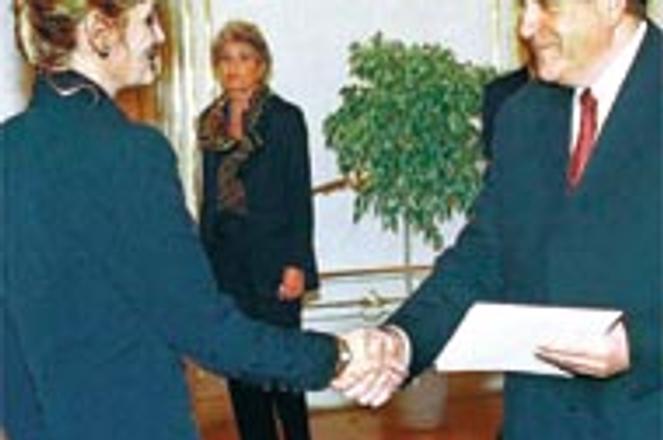See you soon. Foreign Minister Zdenka Kramplová receives ambassador's posting in Canada from outgoing Premier Vladimír Mečiar.TASR
The Slovak treasury is virtually empty, but the outgoing government of Premier Vladimír Mečiar is still paying millions of crowns to have its ambassadorial candidates set up abroad in newly renovated quarters. Members of the former opposition parties, who are likely to form the next government, say that the new ambassadors will be recalled at the first opportunity, and charge that state funds are being senselessly thrown away.
"If some politicians take shelter abroad, knowing that the new government is just about to be created, to me that's incorrect behaviour," said Pavol Kanis, vice chairman of the reformed communist SDĽ party. Eduard Kukan, a former Foreign Minister and a deputy with the SDK opposition party, said that the new appointments were "nothing but a well-constructed provocation against the new government."
The controversy centers on the two main figures of Slovak diplomacy, Foreign Minister Zdenka Kramplová and Ministry State Secretary Jozef Šesták. Both individuals accepted ambassadorial posts - Kramplová in Canada and Šesták in Austria - before they could be officially dismissed from their posts by a new government, despite the fact that their missions will likely last less than a month.
"It is an absolutely non-standard situation," said Ján Fígeľ, Chairman of the Centre for European Politics and an SDK deputy. "It reminds me of a sinking ship with the captain and the first officer [Kramplová and Šesták] already gone while the rest of us stay and refuse to surrender."
The captain's story
On October 7, two weeks after parliamentary elections, Mečiar handed diplomatic credentials to five new ambassadors, including Kramplová, who got a posting in Canada. Kramplová said she didn't see why she shouldn't leave Slovakia, since she had been "approved by a legitimate government."
Kramplová departed for Ottawa two days later, despite an appeal from SDK leader Mikuláš Dzurinda, who is a hot candidate for the Premier's chair. Dzurinda warned "all ladies and gentlemen who try to depart for ambassadorial and other diplomatic posts not to do so, and to wait until the new government approves their nominations."
In addition to the international embarrassment that would attend a game of diplomatic musical chairs, opposition politicians criticized the Mečiar government for wasting millions in taxpayers' crowns.
According to Fígeľ, Kramplová's trip, which included her husband, two children and their baggage, plus an added fee for moving, came to 495,000 Sk ($13,560). The return journey, he said, would cost about the same, not including their two dogs.
"She requested a first-class ticket, which is 110,000 Sk ($3,013) for each family member. Then there is 15,000 Sk ($411) as an extra fee for appropriate new clothing. The family can take up to 700 kg of baggage, and at 72 Sk ($2) per kilogram, the total bill is around 40,000 Sk ($1096)," Fígeľ explained.
Figeľ said that he had that the figures from a Foreign Ministry source, but the authenticity of the figures was denied by an employee of the Ministry's Press Department, who agreed to comment but refused to give his name when contacted by The Slovak Spectator. "It was for sure less than 400,000 Sk ($10,959)," said the official, explaining that the Ministry couldn't release the exact amount because final budget tallies were in progress.
Vienna embassy follies
Kramplová was not the only new appointee who aroused the ire of thirfty opposition politicians. Šesták, appointed Slovak ambassador to Austria on October 8, quickly decided that the appearance of his new home was not suitable for diplomatic purposes.
"You would be ashamed to invite a homeless person to the embassy building," said Šesták, explaining that "we are painting, cleaning, changing the carpets and furniture" to improve the look of the unsightly structure. Šesták denied reports that had appeared in the Slovak media of a 6 million Sk ($164,000) tab for the embassy's reconstruction, but neither he nor the Foreign Ministry was able to furnish the correct figures.
The renovations and appointments came at a time when, according to Marian Masarik, director of the Foreign Ministry's press department, the Ministry was officially cutting back on its expenditures. The cuts took an unusually severe form at Šesták's October 8 press conference, when journalists were not offered their usual coffee and mineral water. Šesták, who was evidently surprised by the situation, asked Masarik for an explanation. "It's by the order of the Ministry," Masarik said.
The appointments and the resulting hard feelings generated considerable debate among opposition parties as to what relationship governments should have with professional diplomats. The SOP of Košice mayor Rudolf Schuster favoured "a similar rule to that in the US, where all ambassadors submit their resignations at the end of the old government's term in office," said Igor Presperín, SOP Vice Chairman. "That's what should have been done here," he added.
Another vision came from the reformed communist SDĽ party. "It would be good if diplomats went on in their missions, regardless of government changes," said Kanis. "It's the sign of a normally functioning state."
According to Fígeľ, the current situation can be partially solved by a new law on diplomacy, which would set the conditions for the nomination and recall of ambassadors. "That's what Slovak diplomatic legislation really misses at the moment," he said.


